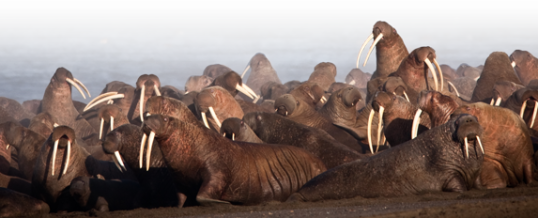USGS Science Feature: October 1, 2014
“Once again, an extreme retreat of Alaska’s summer sea ice has led large numbers of Pacific walruses to haul out on land to rest instead of resting on offshore ice. The walruses are hauling out on land in a spectacle that has become all too common in six of the last eight years as a consequence of climate-induced warming. Summer sea ice is retreating far north of the shallow continental shelf waters of the Chukchi Sea in U.S. and Russian waters, a condition that did not occur a decade ago. To keep up with their normal resting periods between feeding bouts to the seafloor, walruses have simply hauled out onto shore. Hauling out refers to the behavior associated with seals and walruses of temporarily leaving the water for sites on land or ice.
The USGS is tracking walruses in the eastern Chukchi Sea with satellite radio-tags to better understand how sea-ice retreat is affecting these large pinnipeds. The resulting tracking data are not only helping researchers and managers alike better understand changing walrus movements, foraging areas, and use of sea ice habitats in the Chukchi Sea oil lease sale planning area, but they are also providing insights on changes in walrus activity levels during these minimum sea-ice conditions in the summer, which can affect their ability to store fat.
The population-level effects of these hauling out behavioral changes are not yet understood; however, USGS and other researchers do know that while onshore, young walruses are susceptible to mortality from trampling. Additionally, hauling out on shore and using nearshore feeding areas may be energetically less profitable than their preferred behavior of using the ice as a haulout platform on which to rest while remaining near rich feeding grounds.”
Read the entire USGS release here.
What’s a “haul-out”?
From a USGS Science release: “Female Pacific walruses and their calves traditionally spend summers far from shore, diving for benthic invertebrates over the shallow continental shelf waters of the Chukchi Sea. These female walruses and their calves prefer to rest between forage bouts on sea ice drifting above their feeding grounds. However, in recent years loss of summer sea ice over the continental shelf has forced many walruses to travel to the northwest coast of Alaska where they haul-out on shore to rest.”
